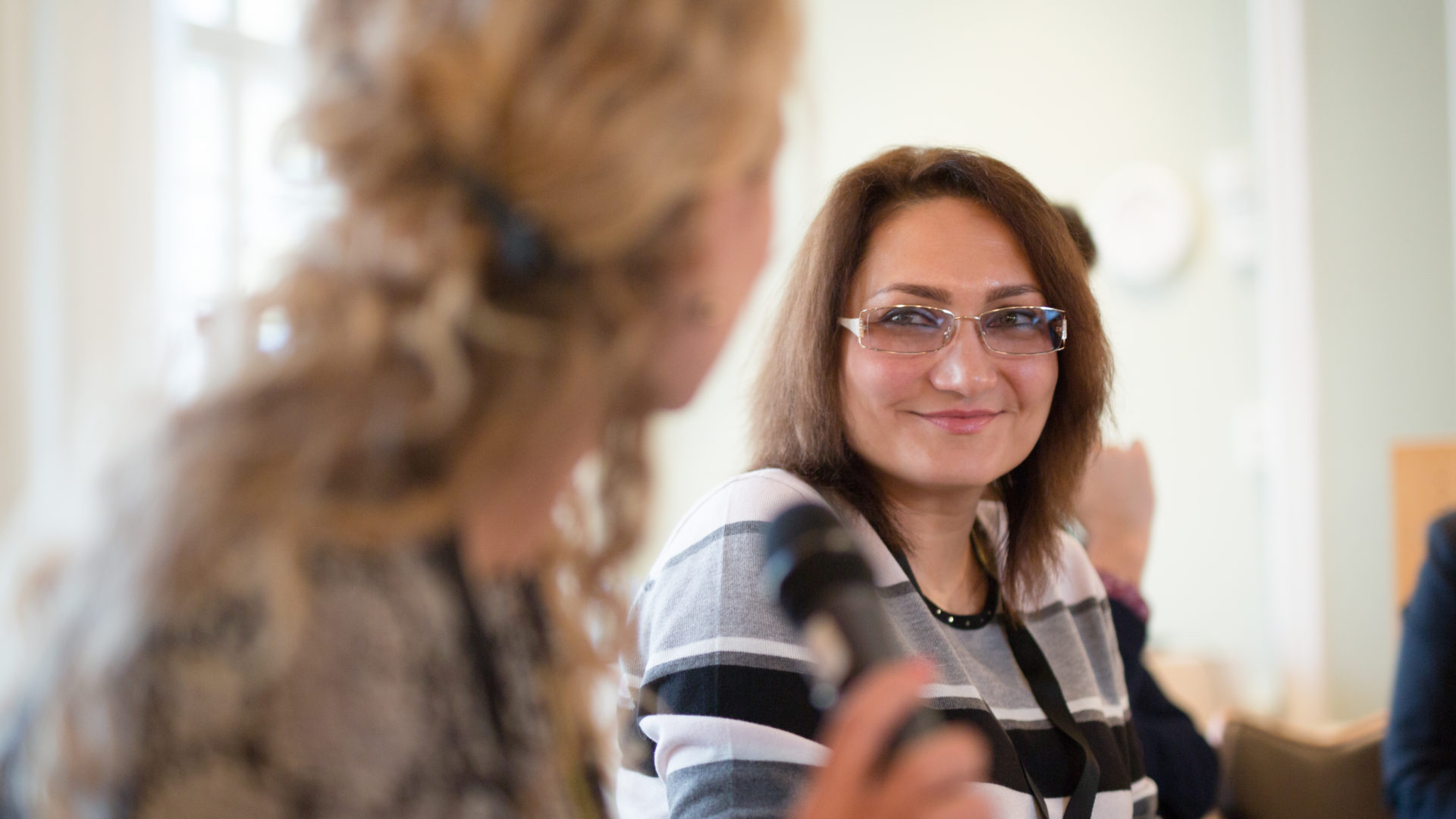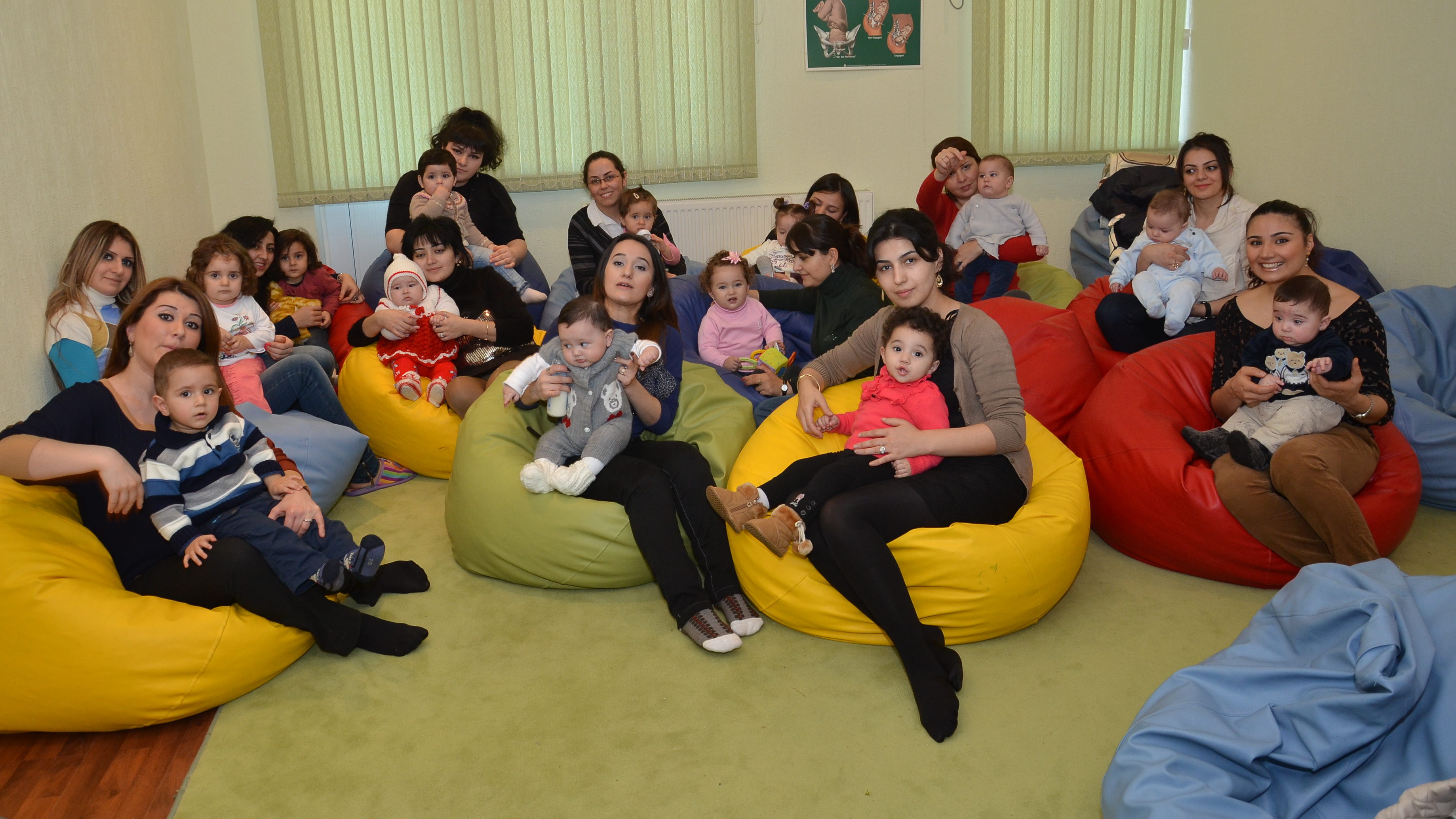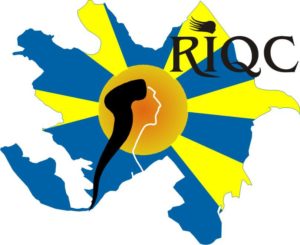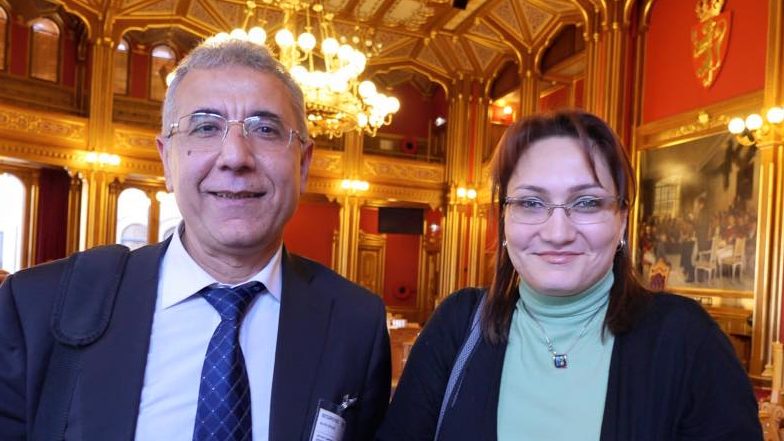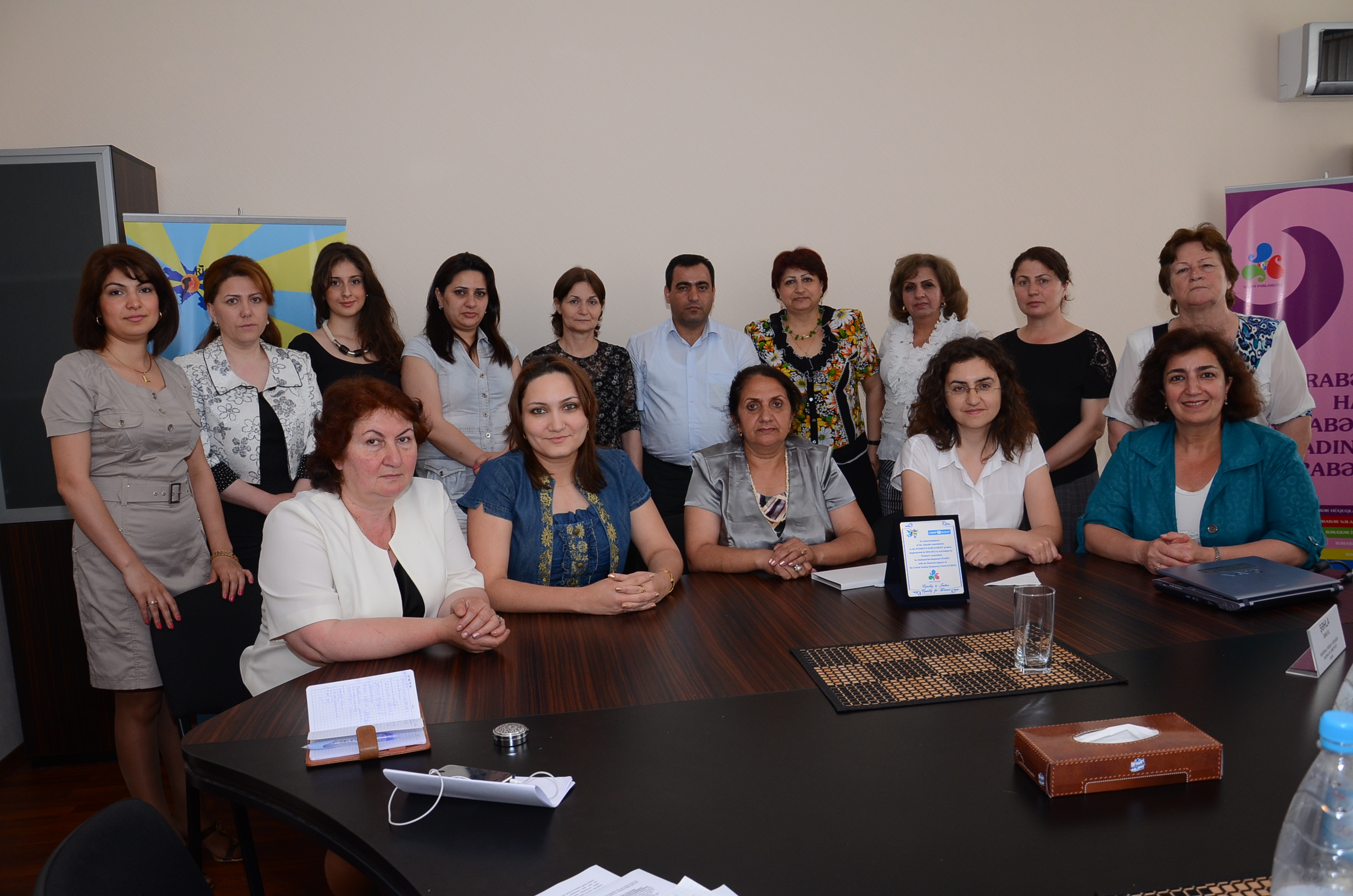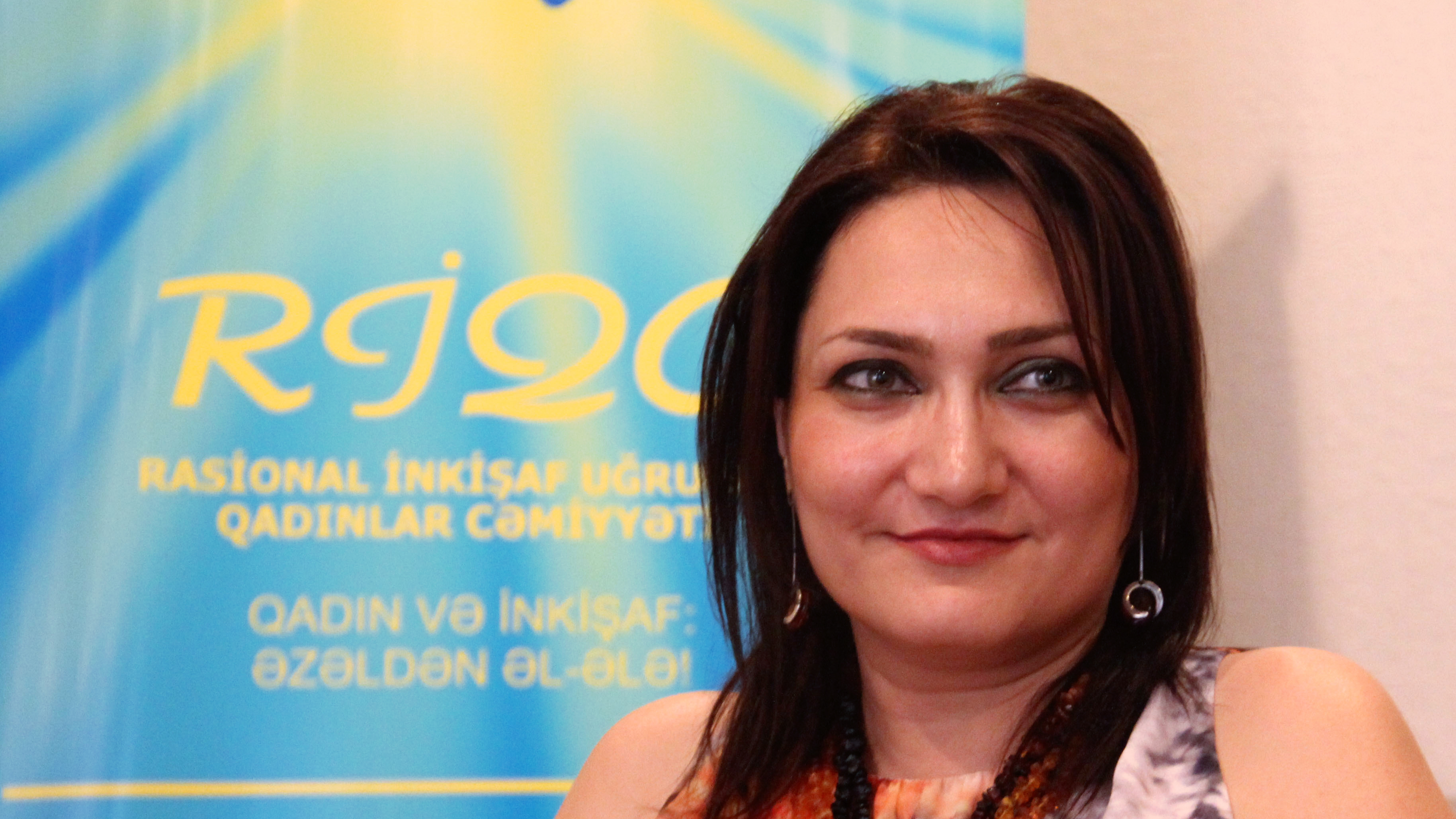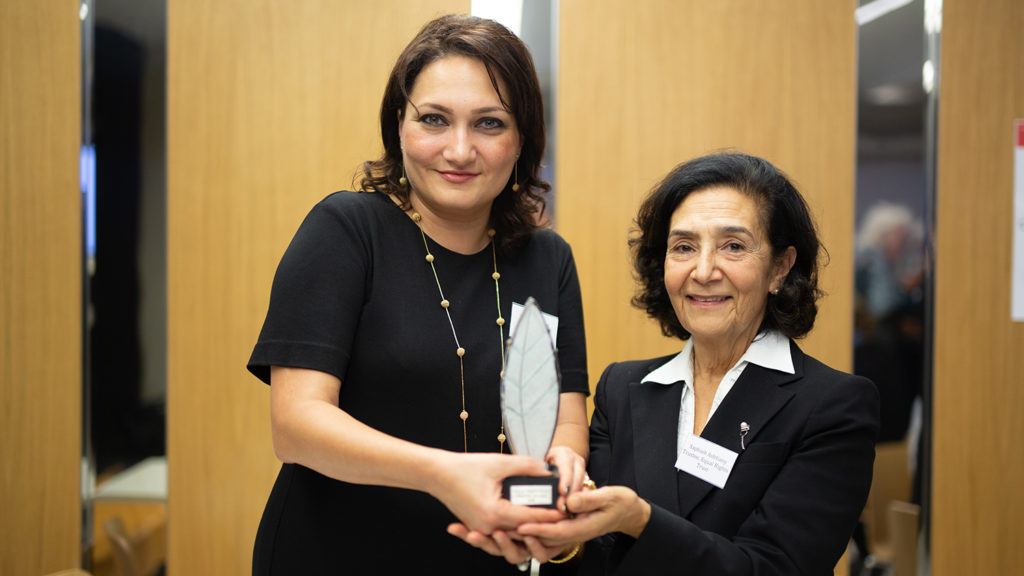
Shahla Ismayil leads Women’s Association for Rational Development (WARD), a member of Human Rights House Azerbaijan. WARD empowers women and promotes gender equality and has a lot to be proud of, having pioneered dozens of significant initiatives empowering women over the years.
Establishing an organisation for women by women
“The moment when I decided to create my own organisation was very emotional. I realised that I could and wanted to do more for the women of Azerbaijan. It was extremely sudden and quick – the idea hit me in an instant.”
Shahla Ismayil’s first formal experience with human rights came working at the Human Rights Resource Center from 1998. During this time, she got to know the Azerbaijani human rights community and furthered her education in the field. Her realisation of the need to start her own organisation came about three and a half years in.
“I believed that women needed empowerment to play a much-deserved role in the life of the country. I believed in justice and I believed in the power of women, and I still do. So, with my female peers and friends, we established WARD. I continued my informal education in human rights, democracy, and good governance, took fellowships, and participated in dozens of trainings in Azerbaijan and abroad.”
The next day, she resigned from her position, and within a few weeks she had visited several regions in Azerbaijan with her soon-to-be co-founders. They went door to door talking to women, learning about their problems and experiences. With this information, they came up with a vision and mission.
“At first, because it happened so fast, our vision and mission were quite broad and needed refinement, but the work we were doing, it was exciting, and it felt right, we just did it, we just acted.”
“If you take our logo for example, quite recently, I met with a colleague who suggested that maybe it isn’t the most well-designed logo, and perhaps that could be right, but it is so dear to us. It is Azerbaijan, with women at the heart of the country, and the land is full of light, joy and sunshine – this is our vision and it is very dear to us”
Shahla Ismayil’s confidence in her cause continued to grow as she continued to learn about the cases and the situation in the country, and so too did her determination to bring justice to women.
“I remember the first outcomes of our work: we found that, in small cases, justice at the micro level could be achieved. This, for me, was the sign – the evidence that we can make the difference.”
“Joining the family of the network of Human Rights Houses was another landmark occasion for me; we entered the new and exciting journey of challenges and opportunities with my international colleagues – human rights defenders. At that time, I started clearly identifying myself as a woman human rights defender.”
While Shahla chose the path of seeking change and improvement in women’s rights, not all women have the opportunity to make such a change in a country where women are under pressure in many sectors of society.
Azerbaijan has the second highest rate of sex-selective abortions in the world according to the United Nations Population Fund (UNFPA). While this leads to an imbalance in the population, it does not fully account for a gender ratio of school children in 2016/17 of 41.5% girls to 58.5% boys, or a
gender ratio in higher education in 2017 of 43% women to 57% men. And the situation is deteriorating, with 26.6% fewer women pursuing higher education in 2018 compared to 2007. Other issues include underage marriage in 2017, with 22 cases according to official statistics, though women’s groups report a much grimmer situation.
With WARD, Shahla set out to improve the prospects of women, ensuring that the organisation itself adhered to this principle. All members of WARD’s governing structure are female, 10% of staff are male, and around 50% of their expert pool are men.
“In Azerbaijan, it is not very common to have females in key positions, but we are women’s organisation, so it’s natural for us. It has not been difficult to keep it like this for years, because we are widely known in the country; we are acknowledged and respected as a women’s NGO. Moreover, we are more known as gender advocates, so we have a lot of men on board in the capacity of experts, supporters and campaigners. The noteworthy part of it is that we engage men and they appreciate it.”
“Today, WARD’s mission is based on the notion that full democracy, justice and development cannot be reached if there is any distinction, exclusion, or restriction made on the basis of gender, age, religion, ethnicity and affiliation. We struggle against any kind of discrimination and violence. Our vision is a democratic and prosperous Azerbaijan, where women are empowered with knowledge and consciousness to be equal and active citizens of the country.”
Early life and inspirations
“My family has always been supportive and respectful of my education, employment and marriage choice – unfortunately, this is not something that most young girls in today’s Azerbaijan enjoy.”
“My Mother is my eternal source of inspiration. She is an economist with higher education, who fully dedicated her life to us, her family. Although she never could make her career because of her family burden, she strongly supported me and my sister in continuing our education, working towards our goals and dreams. If I am a strong and confident woman, it is because I have learned from a strong and confident woman. She was always fiercely passionate about education, often saying that education is the key to all success. She is proud of the work that I am doing and is the first person to support me.”
Growing up in a politically active family, her father – part of the leadership of Azerbaijan’s main opposition party – left its mark on her:
“Believe me, my father’s oppositional affiliation made our life much more difficult than for the average family. But we have always been proud of his choice and supported his fight. My father is a traditional Azerbaijani man, but he is very fair, democratic and honest. He is a man of principles and dignity – so to have such an example throughout my childhood and youth – this shaped me. I was raised as a leader, always fighting for justice and equality – it was so natural, almost as if it could not be any other way. “
“Even before my father – my two grandfathers were big justice men – one was a famous prosecutor and the other was a chief of police. These were different times, a different Azerbaijan, when working in law-enforcement was considered a most honourable profession. Years after their death, I still hear the stories about their input to the society and fight for justice and I feel so proud of them.”
“My husband, luckily, is another example of being traditional, yet modern enough to support my choices and career. He respects my activities and even supports the decisions I make that take a lot of courage. I wish that every woman of Azerbaijan can enjoy this freedom of choice and respect to life which I experience from my wider family.”
She describes her inherent and personal “moral need” to fight for justice and equality, as stemming from her family. Sharing her earliest experience with this moral need, she recounts an incident at her school when she was twelve years old where she physically fought a bully who was harassing another girl:
“There was a girl, a year older than me, who had a skin condition that caused problems with her hair and as a result, she was the target of constant cruelty, jokes and bullying.”
Reflecting on the incident with a chuckle, Shahla Ismayil elaborated that “while I definitely regret the violence, which I have long since abandoned as a strategy, I really felt proud of the justice that I had observed and helped initiate – there was an investigation by the headmaster and the bully’s parents were called to the school. They explained the girl’s condition to the bully and helped her to understand that she needed compassion rather than hostility.”
Discussing inspiring women in her life, Shahla Ismayil’s thoughts turn to figures from her country’s history:
“I love women, all women, and all women inspire me – anyone who just dared to make a small step towards her future with making even a micro-change, as I truly believe that big journeys start with the single step, as the famous proverb says. We are surrounded by inspirations, we just need to learn seeing them among the injustices, violations and discrimination.”
“Our history knows many women, who dared to change, to resist, to oppose. We have outstanding national role models – Hamida xanim Javanshir, Agabeyim Aga, Leyla xanim Shikhlinskaya and others. They are national treasures, women who went against the prejudices and stereotypes and managed to leave their mark on history.”
“The sad thing is that I did not know about them up until we started the women’s empowerment program in WARD, when we researched and collected their stories. I strongly believe that these stories should be included into the state education, so that our girls can get inspirations from these amazing ladies.”
Watch the film Republican Women Daring to Change (with English subtitles), produced by WARD. This narrates historical events in Azerbaijan from 1870 up to the modern period, highlighting the role of women in these events.
Challenges from the authorities and from civil society
“Being independent in Azerbaijan means being under the government’s spotlight. You are always under surveillance, watched, and listened, and since August 2014 I have been blacklisted by the government.”
WARD has been under investigation, with bank accounts frozen and documents and computers confiscated. Staff, experts and collaborators have also been interrogated. Shahla Ismayil was under a travel ban, with the stressful taking her close to burnout. This pressure was relaxed in 2016, but she is still being stopped and checked at the Azerbaijani border every time she leaves or enters her own country.
Her belongings are searched and she has to declare even the smallest amount of money. She receives threatening messages and hints at every step, something that has been a sad reality of her life for many years.”
“I have always had a critical and outspoken standpoint – many people think that if you have a women’s agenda, that it is sort of soft issue and that you don’t confront much. But it is not true – women’s rights cannot be at good level in a country where the general human rights record is poor. So, most of the issues which we combat are related to discrimination, which is not only related to traditions and stereotypes, but also to the lack of rule of law, corruption, and bad governance. And of course, these are very political issues.”
“Human rights go hand-in-hand with good governance, which we never enjoyed as a country. Therefore, we have never enjoyed support or understanding from the government. In fact, in Azerbaijan the term ‘non-governmental’ is often perceived as ‘anti-Azerbaijan’ by the government and sometimes even by society. Always working against heavy odds, makes you feel like you’re swimming against the current and you can hardly imagine it can be different. And the more critical your position is, the more challenges you face.”
She has also faced challenges from within civil society, some even questioning her independence. She cites unhealthy competition, exasperated by the crackdown on civil society, as the main factors for a fragmented NGO community in the country.
“The opposition accuses me of working with the government, and the government accuses me of working with the opposition. The truth is that I am independent – I work with all the stakeholders, and have no problem with sitting at the table with anyone and engaging in dialogue. I just proceed and only do what I think is good.”
“When people criticise me, it is usually done behind my back. These same people are then surprised when I continue to support their causes. If we have a common goal, we shouldn’t be distracted by these petty things. It can be painful when you get these blows from the people that you trust – but I can survive these things.”
Ismayil has a few methods for coping with these challenges:
“I have made it clear to everyone – I am not going to leave my country and will continue my life and work in Azerbaijan no matter what. And I just continue – doing what I believe is right – educating, protecting, monitoring, advocating, reporting, campaigning, networking for gender equality and women’s rights.
My strongest feature is that I never lie and I never play the dishonest games, therefore, if there is a threat or challenge I just openly and honestly face it and proceed. I try to not get depressed, even if I get upset, I don’t show it. I try to look good, always smile, stay available and accessible to my constituencies and always openly communicate my challenges if I am asked. This is my coping strategy and this has worked for me so far.”
Working towards a truly independent and democratic Azerbaijan
“I am very positive about Azerbaijan’s future, which I believe will be shaped by justice and equality. I also believe in the country’s main resource in this cause – its people. Azerbaijanis are smart, hardworking, honest and constructive. These beliefs are what drive me, they keep me alive.”
Looking to the future, Ismayil believes honesty, courage, wisdom, and dignity are the values that will help Azerbaijanis endure the current hard circumstances and ultimately enjoy a bright future.
“For this to happen, Azerbaijan must restore the rule of law and justice system first of all. The courts should be independent, justice should be restored. People should be protected by the law and the law-enforcement needs to re-claim its honourable status in society, like in my Grandpa’s time. Only then can we fight corruption, make the reforms and change the whole concept – the government is there to serve the people. Then we will have the true political will to value people and to build on the vision of the country that our ancestors started a century ago – a truly independent and democratic Azerbaijan.”
Much-needed work
WARD’s work for women’s rights is much needed in a society where domestic violence accounts for 75% of murdered women (in 2016). WARD combined reports of the Ministry of Internal Affairs with media monitoring, and found that out of 110 women murdered, 48 were murdered by their husband, former husband, or partner, while 35 women were murdered by their father, brother, son or other close relative.
In a recent and quite controversial campaign, WARD produced a series of postcards in collaboration with artists. The postcards feature the call: “STOP! Violence against women”. They feature provocative images of violent settings co-created by an artist and a photographer. WARD sent them to 500 people, including 125 members of the parliament and all ambassadors.
“We were contacted by an academic, asking why he received our materials and insisting that he doesn’t beat his wife – but this isn’t about his wife! As we explained in our cover letters, we saw him and his colleagues as potential ambassadors, as agents of change.”
“Two MPs thanked us for our great awareness raising work. Both of these people were men, so although we have 21 women in the parliament, none of them responded. Khazar University asked our permission to publish the images in the University newspaper. These pictures are very shocking, but we deliberately did this – just because your eyes are closed doesn’t mean that reality has disappeared, it is important to keep your eyes and ears open.
About Shahla Ismayil
Shahla Ismayil is a gender advocate and woman human rights defender. She currently chairs Women’s Association for Rational Development (WARD), an organisation that she founded in 2002. WARD’s four priority programs are; gender equality, economic development, healthcare, and peacebuilding. Shahla Ismayil is Human Rights House Foundation’s attorney in Azerbaijan, as well as an advisor for two grant-making women foundations.
She is a John Smith fellow (UK, 2005) and a Bill Maynes fellow (USA, 2011). In April 2018, she was awarded with the “Personnalités d’avenir” Fellowship by the French Ministry of Foreign Affairs. Shahla Ismayil has been initiated than 100 projects and programs in the field of human rights and gender equality. She has authored over 120 articles and publications both within the country and outside it. She works in partnership with over 50 international institutions, including UN agencies, EU, OSCE, Council of Europe, Human Rights House Foundation, Konrad Adenauer Stiftung, USAID, Asian Development Bank and many others.
She is married and is the proud mother of twins.
About WARD
Women’s Association for Rational Development (WARD) is a women’s NGOs established since 2002 to contribute to the development of Azerbaijan through women’s empowerment and participation.
WARD’s staff consists of founders, members, staff-members, activists, supporters, volunteers, gathered on the basis of common goals and interests.
WARD participates, joins, and supports numerous national and international events, actions, and campaigns through which it is possible to contribute to women’s empowerment. WARD is also a member of several national and international networks, in accordance to its mandate. Among them is the network of Human Rights Houses and Global Network of Women Peacebuilders.
In 2007, WARD established the first maternity school in Azerbaijan, holding informal childbirth classes for expecting mothers and advocating for a comprehensive education agenda on reproductive health and rights. The same year, it set up the first Women’s Resource Center, with modest facilities including a library and a conference room that could host up to 30 people for events.
Later, in 2010, it formed the country’s first expert group on gender, to strengthen women’s rights organisations in Azerbaijan. These experts advise on gender-friendly practices in organisational management, financial administration, and leadership. Strengthening the role of women in politics, WARD then established the Women’s Parliament of Azerbaijan, an informal union of 25 outstanding women from six sectors, who united to advocate for the protection of women’s rights and to submit comprehensive shadow reports to the United Nations Committee on the Elimination of Discrimination against Women (UN CEDAW).
To facilitate dialogue between municipalities and communities on gender, it founded women councils at municipalities in 2011. Then, with a move into the private sector in 2014, it founded Gender Port, a company providing consulting and advisory services that advance gender equality and women’s empowerment in Azerbaijan and around the world.
Most recently, it founded “Gender School” in 2017, with a group of gender academics uniting to mainstream gender into state institutions and to strengthen mechanisms focused on gender in Azerbaijan. In 2018, WARD drafted the first National Action Plan under UNSCR 1325 – a UN resolution acknowledging women’s central role in the prevention and resolution of conflicts, and which calls for their participation in peace and security efforts. If adopted, this will be the landmark document for the country’s “women peace and security agenda”.
In addition to these initiatives, the organisation has also been at the forefront of several campaigns and awareness raising efforts in the country.
In 2009 WARD produced and launched the documentary “Life Betrayed”, a story of a woman exposed to violence, and after the first screening, hosted a signature campaign with around 200 audience members. Among audience were the ombudsperson, representatives of the government, embassies, international organisations, NGOs, and media.
Interviews with Defenders from the Human Rights Houses
Olga Skrypnyk
Mamikon Hovsepyan
“When I was a teenager I left Armenia because, as a gay person, I felt unsafe. I moved to the United States and found it to be a huge change. After living there for about 4 months I felt that if I wanted freedom and peace, then I would have to earn it – and that I wanted to work for change in my country.”
Read more in The Reality of LGBT+ activism in Armenia.
Lara Aharonian
“In society, if we can resolve gender identity and orientation, other things would be very easy to resolve. Feminism is intersectional, you can’t raise the issue of patriarchy and only talk about women. Patriarchy attacks all kinds of people that aren’t the so-called social “norm”.
Read more in Fighting for Women’s Rights and Equality in Armenia.


